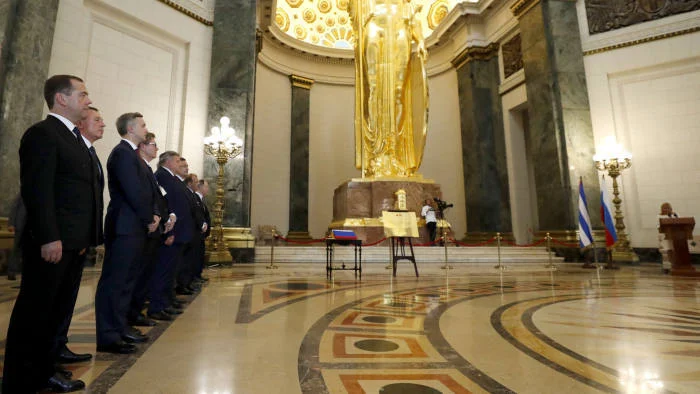Russian President Vladimir Putin (R) shakes hands with Cuban President Miguel Diaz-Canel during a signing ceremony at the Kremlin in Mosco...
 |
| Russian President Vladimir Putin (R) shakes hands with Cuban President Miguel Diaz-Canel during a signing ceremony at the Kremlin in Moscow on November 2, 2018. (AFP Photo) |
The new warmth between Moscow and Havana is still a far cry from the close embrace of Soviet times, when the Kremlin poured huge subsidies into Cuba to prop up the economy and tried at the peak of the Cold War to station nuclear missiles on the communist-ruled island, triggering a major crisis with the US. The more recent Russian gestures are more limited in scope and are intended to allow President Vladimir Putin to create trouble in the US’s backyard without incurring major liabilities, analysts said. “Russia sees Cuba as a useful place to show global power muscle at little cost as it is 90 miles off the US coast and evokes memories of the cold war,” said Bert Hoffman, a Cuba expert at the German Institute of Global and Area Studies. “Compared to other ventures, such as entering the Syrian war, the risks and costs are low and the publicity effect is great.” Miguel Díaz-Canel, Cuban president, visited Moscow in October for the second time since his inauguration 18 months ago and Mr Putin promised him a return visit to Cuba soon.
 |
| Dmitry Medvedev, Russia’s prime minister, left, at a ceremony honouring Russian specialists who helped restore Cuba's 'Capitolio' building © Dmitry Astakhov/TASS |
“Russia’s increased presence is not seen by most Cubans as forced or unilateral, but one that helps the economy at this very difficult moment,” said 57-year-old Orlando Matos, who runs a hamburger restaurant in Havana. In a signal of most favoured nation status, the Russian pavilion was the first to open at Havana’s annual international trade fair in November. Moscow is providing hundreds of millions of dollars in cheap credit and government guarantees, allowing Havana to contract Russian firms to upgrade Soviet-era steel mills and to buy Russian cars, trucks, minibuses, planes and locomotives and spare parts. Trade increased 34 per cent to $388m in 2018, almost all of it exports from Russia, according to Moscow. The forecast for last year is $500m. Although Russia is catching up, other allies are still more important commercially.
Trade with China was $2bn in 2018 and with Spain $1.3bn, according to the Cuban government, though there was little fresh Chinese investment reported. It is impossible to track how much Russian money is reaching Cuba, but a source at the state-run International Finance Bank said it was more than from other countries.
Russia is looking for a warmer relationship with Cuba than China has and is trying to build one with less of a purely economic content. (PAUL HARE, former British ambassador to Cuba who lectures at Boston university’s Pardee School of Global Studies)The two biggest Kremlin-backed projects are a $2bn upgrade of the railways over the next decade and a plan worth more than $1bn to build and install four 200 megawatt generators by 2024, with the first already under construction by Russian electrical power generating company Inter RAO. Russian energy giant Rosneft began shipping some fuel to Cuba in 2017 and is working with the local oil monopoly to extract additional crude through non-chemical fracking from spent fields off the northern coast. Rosneft also flies workers to Cuba for vacations that include medical check-ups. Cuba reported 125,000 Russian tourists arrived last year through October, a more than 20 percent increase over the previous year, but it was not clear how many were Rosneft employees.
Russia will be the guest of honour at Cuba’s tourism fair in 2020. “Russia is looking for a warmer relationship with Cuba than China has and is trying to build one with less of a purely economic content,” Paul Hare, a former British ambassador to Cuba who lectures at Boston university’s Pardee School of Global Studies, said. Mr Hare said Russia viewed rivalry with China as a growing issue in the developing world, even as it badly needed to stymie US coercive measures against Iran, Venezuela and Cuba. “If US sanctions succeed in dictating global outcomes that would be a serious blow to the world order Russia favours,” he said.





